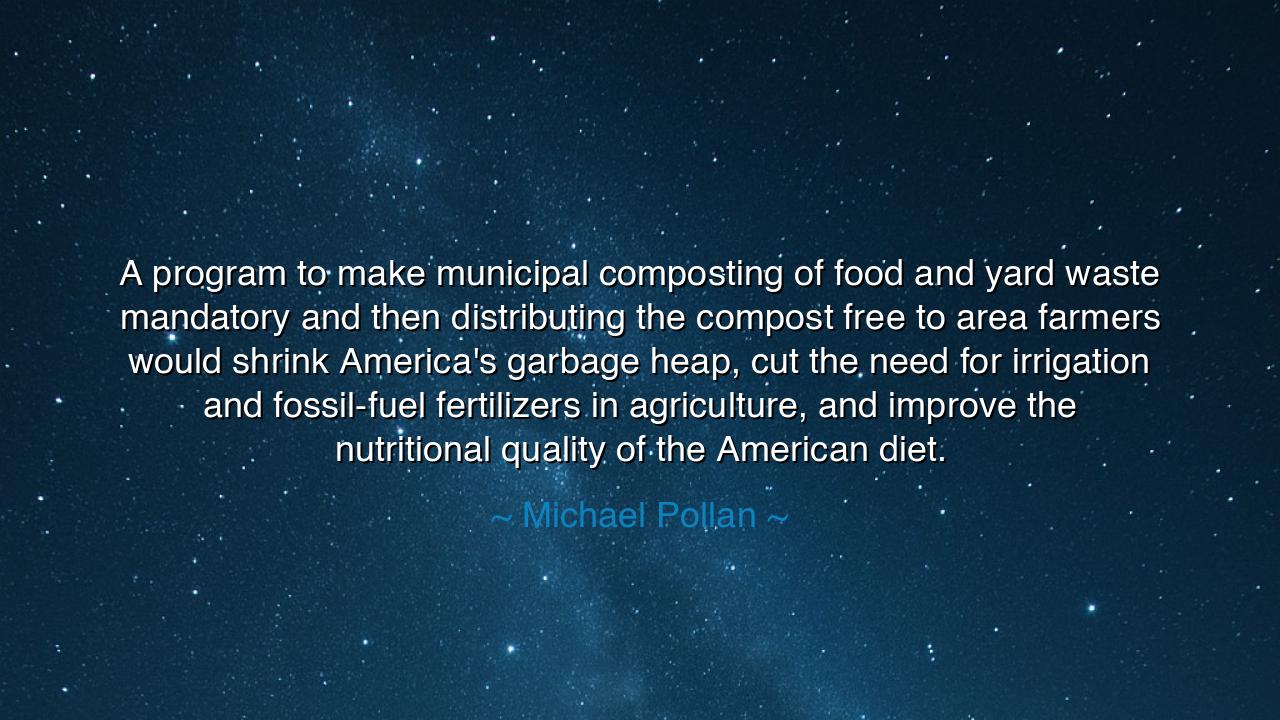
A program to make municipal composting of food and yard waste
A program to make municipal composting of food and yard waste mandatory and then distributing the compost free to area farmers would shrink America's garbage heap, cut the need for irrigation and fossil-fuel fertilizers in agriculture, and improve the nutritional quality of the American diet.






The words of Michael Pollan, “A program to make municipal composting of food and yard waste mandatory and then distributing the compost free to area farmers would shrink America's garbage heap, cut the need for irrigation and fossil-fuel fertilizers in agriculture, and improve the nutritional quality of the American diet,” are not merely a vision of environmental reform — they are a summons, an invocation of ancient wisdom long forgotten. For in this idea lies the sacred cycle of life: that what we discard returns to nourish us, that decay is not an end but a beginning, and that humanity’s health is woven into the soil beneath its feet. Pollan’s words, though clothed in the language of policy, echo the timeless teachings of the earth itself — that nothing in nature is waste, and that balance is the first law of survival.
In this age of excess, where the land groans beneath mountains of refuse and rivers choke on the remnants of human appetite, Pollan’s call to composting is a call to remembrance — a return to the ancient covenant between humankind and the soil. Once, the farmers of old understood this sacred bond. They knew that what grew from the earth must one day return to it, that the scraps of one harvest became the seedbed of the next. But modern civilization, in its hunger for convenience, severed this circle. We cast our food to the garbage heap, our leaves to the landfill, and in doing so, we cast away the wisdom of generations. Pollan’s vision seeks to restore that forgotten harmony, to rejoin the natural rhythm of death feeding life.
In the fertile plains of ancient Mesopotamia, it was said that the first farmers gave back to the soil what they took from it. They spread the ashes of their fires and the remnants of their feasts upon their fields, and the earth rewarded them with abundance. They understood what Pollan teaches now: that waste is not the enemy of life, but its teacher. When matter decomposes, it releases the very essence that renews creation. To compost is to participate in this eternal exchange — to humble oneself before the wisdom of decay, to turn what was unwanted into sustenance.
Pollan’s insight also reveals a deeper moral truth: that the health of the land and the health of the people are one. When the soil is impoverished, the food that grows from it is weak, and so too becomes the body that consumes it. Modern agriculture, dependent on fossil-fuel fertilizers and endless irrigation, has forgotten this truth. We feed the earth with chemicals, and it gives us food stripped of its vitality. Yet Pollan’s proposal — to create compost from the abundance of our own waste — is not only a solution of practicality but of philosophy. It is an act of repentance, a way of healing the broken relationship between human labor and the living world.
There is a story told of George Washington Carver, the great agricultural scientist of the American South. He would walk through the fields of exhausted soil, ruined by years of cotton farming, and say to his students, “The soil has a soul.” He taught farmers to rotate crops, to replenish the land with organic matter, to honor the dirt as if it were alive — because it was. Carver’s work restored fertility where there had been barrenness, not through machines or chemicals, but through reverence and understanding. Pollan’s call for municipal composting carries that same spirit: that we can heal the land not through domination, but through cooperation with the cycles of nature.
The garbage heap, that symbol of waste and decay, becomes under Pollan’s vision a source of redemption. What was once seen as useless can become holy once more. The scraps of last night’s meal, the fallen leaves of autumn, the peels and stems of forgotten produce — all can be transformed into life-giving soil. And when this compost returns to the hands of farmers, freely and abundantly, it carries not only nutrients but the spirit of community. The eater, the grower, the city, and the earth become partners again in the sacred dance of sustenance. Through such harmony, even the American diet — long corrupted by industrial excess — can find renewal, as the food grown from living soil carries within it the vitality of the living world.
Let this then be the teaching: nothing in nature is wasted, unless we forget how to use it. The peel, the pit, the leaf, the root — all have purpose in the great circle of life. The soil is not an endless receiver, but a breathing being that must be nourished as it nourishes us. To compost is not simply to dispose; it is to participate in creation. Each household that separates its scraps, each farmer that spreads humus on their fields, each community that turns its refuse into renewal — these are not small acts, but sacred ones.
So let us remember the old covenant: that what comes from the earth must return to it. Let us build cities where compost replaces waste, where the soil once again smells of life, and where the food upon our tables feeds both body and spirit. For in the humblest act of turning waste to soil lies the highest form of wisdom — the knowledge that all life is one, and that to care for the ground beneath us is to care for the future of all humankind.






AAdministratorAdministrator
Welcome, honored guests. Please leave a comment, we will respond soon